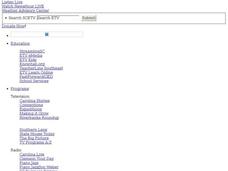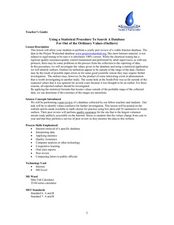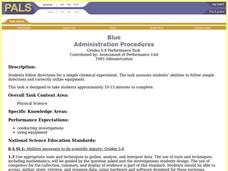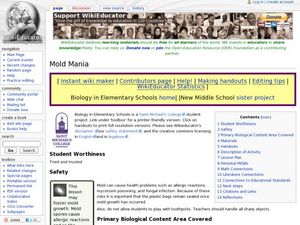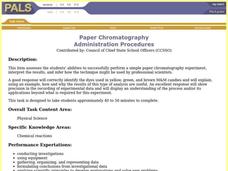Curated OER
Global Temperatures
Students analyze the global temperature record from 1867 to the present. Long-term trends and shorter-term fluctuations are both evaluated. The data is examined for evidence of the impact of natural and anthropogenic climate forcing...
Curated OER
Living in Extreme Environments
Students examine the characteristics of the ocean floor and the importance of of extreme environments. For this investigative lesson students use four methods to sample populations, gather, record and analyze data from a scientific...
Curated OER
Exploring the MapleCopter
Study explore the motion of maple seeds and design experiments to explain their spinning flight patterns. They make observations, explain ideas of motion, use models, analyze previous reports and experiments, identify relevant factors...
Curated OER
The Ups and Downs of Weight and Mass
Young scholars explore the concept of mass, and how it differs from weight. They also calculate their weight change as they ride up and down on an elevator. They record the changes in their weight as the elevator moves
graph the...
Curated OER
Using a Statistical Procedure To Search A Database For Out of the Ordinary Values
Learners develop a spreadsheet containing formulas and find summaries for them. In this investigative lesson students choose a topic, investigate it and use MS Excel to sort data.
Curated OER
Mapping Possible Solutions
Fourth graders propose possible sites for the heart of Florida state capital by mapping collected data onto a Florida state map and recording data in a Travel Log.
Curated OER
Starch and Sugar Testing 1
Eighth graders determine the presence of starch and sugar in unknown solutions. This task assesses students' abilities to observe, record and interpret data, classify, generalize/infer, construct data tables, and identify sugar and...
Curated OER
Will There be Enough Water?
Learners investigate water usage, water available, and water demand historically in the local area. They use projections of water usage, availability and demand up to the year 2050. Students use graphs to relate as well as compare and...
Curated OER
The Modern Atmospheric CO2 Record
Students compare carbon dioxide (CO2) data from the Mauna Loa Observatory , Barrow (Alaska) , and the South Pole over the past 40 years to help them better understand what controls atmospheric (CO2).
Curated OER
Population Density
Students use the scientific method to conduct an experiment and use varied methods to gather background information. They correctly use lab equipment and prepare tables and graphs that organize, conclude, and present their findings. ...
Curated OER
Marine Protected Areas
Learners design a research project about a Marine Protected Area they chose. In this marine biology lesson, students gather fish count and catch data then graph them. They create an information poster about their findings.
Curated OER
Investigating the Effect of Minerals on Plant Growth
How do different minerals affect the growth of plants? Budding botanists find out in a multi-week experiment that has them using solutions with specific mineral deficiencies. While there is a lot of preparation for the investigation,...
Curated OER
Through Thick or Thin!!!
Students differentiate between high and low viscosity. Students collect, graph, and interpret data, then quantitatively measure polymer solids. Students experiment with a household example of an emulsion polymer.
Curated OER
Weathering Rates
Students calculate weathering rates from tombstone weathering data. Atmospheric (and precipitation) chemistry determines the rate of weathering for marble tombstones. They are shown data from a rural and an unrban cemetery, and are...
Curated OER
Deep Freeze
Students practice various sampling methods for retrieving data under water, ice, and soil. They use the sample material to make temperature measurements, chart contents, and draw their own conclusions as to what is happening in the...
Curated OER
Density of Minerals
Learners determine the mass, volume, and density of two different mineral samples. Students show data and calculations as well as answer questions about the mineral identities.
Curated OER
Threads
Students group observed data, filtering from all their observations the similarities between burring threads. In the second part they make a comparison of a chosen attribute between the two threads.
Curated OER
Blue
Students follow directions for a simple chemical experiment. They use the appropriate tools and techniques to gather, analyze, and interpret data. Students identify a substance that has characteristic properties, such as density, a...
Curated OER
Primary Biological Content Area Covered
Young scholars use the scientific method to make predictions about mold growth. In this fungus lesson, students use worksheets to help them illustrate predictions and graph mold growth from white to wheat bread. Young scholars first...
Curated OER
Snow Science
Students investigate how efficient different substances are at melting snow. Students collect and analysis data.
Curated OER
Believe It...Or Not
Students critically analyze data regarding climate changes using a glossary of terms generated by examination of climate related articles. They examine and graph climatic data, and discuss, hypothesize and test apparent discrepancies in...
Curated OER
Paper Chromatography
Small groups of students perform paper chromatography to separate food dyes into their component colors. Students perform the experiment and collect, organize, and represent their data to form an explanation of their outcomes. Students...
University of California
Hot! Hot! Hot!
Calories are not tiny creatures that sew your clothes tighter every night, but what are they? A science lesson, presented at multiple levels, has learners experiment with heat, heat transfer, and graph the function over time....
Curated OER
Identifying Creatures
Learners use a classification key from a provided worksheet to identify creatures. This task assesses student's abilities to interpret data, make decisions, identify, and classify.





